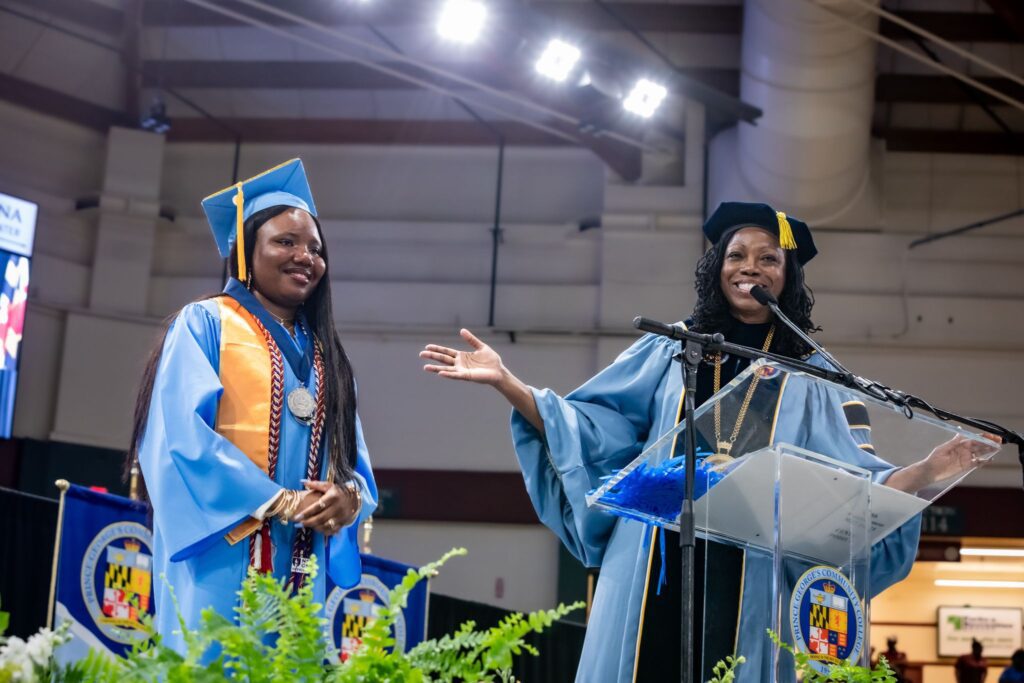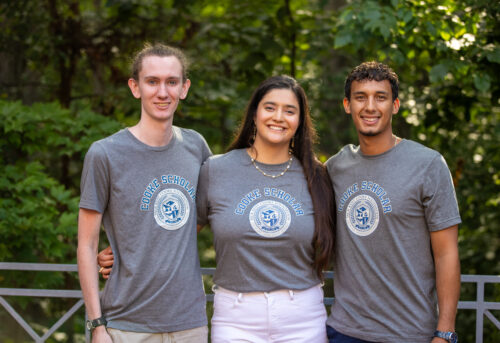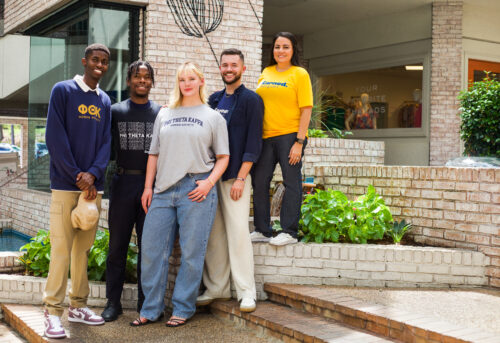Ahnora Ozor, a student at Prince George’s Community College (PGCC) in Maryland, has been named the 2025 Phi Theta Kappa Founders Medal Award recipient. Ozor received a $1,000 scholarship and the 2025 Founders Medal Medallion at PGCC’s spring Commencement Ceremony this past week.
This award is presented to one graduating PTK member whose essay most powerfully conveys the value of a community college education. Ozor’s essay was selected from over 1,200 entries.
“Community college students are often too transactional—only there to take classes. Ahnora wasn’t like that at all. She was involved in every opportunity available to her at PGCC—both inside and outside of the classroom,” said Phi Theta Kappa’s President and CEO Dr. Lynn Tincher-Ladner. “We are proud of Ahnora and students like her who make their community college experience a transformational one.”
During her time at PGCC, Ozor was an active member of Phi Theta Kappa and served as a Vice President of the Student Government Association (SGA), President of the African Student Association, and was the founding member of PGCC’s Debate Club.
Read excerpts from Ozor’s Founder’s Medal Award essay:
Attending Prince George’s Community College (PGCC) is one of the best decisions I have ever made because the opportunities that came with it were endless- internship opportunities, scholarships, clubs etc. I started taking college credits in high school as a dual enrolled student in 2021 and it was exciting for me to begin my college career while in high school. It had its challenges with me having to juggle high school and care for a few dependents I had but it was definitely worth it. These experiences taught me perseverance and time management. The cost and affordability of community college is also another reason it is highly valued, especially for students who face financial challenges. Writing from personal experience, as an immigrant with limited resources, I have been able to pursue a college education because of the existence of community colleges. This accessibility has not only opened doors for my academic growth but has also provided me with the foundation to build a brighter future.
At PGCC, I discovered opportunities that helped me grow both academically and personally. I joined various organizations and took on leadership roles, becoming Vice President of the Student Government Association (SGA) and President of the African Student Association, as well as participating in the Debate Club and more. Additionally, joining Phi Theta Kappa (PTK) has opened doors to numerous opportunities, including this one.
Serving as Vice President of SGA has allowed me to represent the student body and connect with influential figures like Samuel Levine, Director of the Bureau of Consumer Protection at the Federal Trade Commission (FTC). These experiences have deepened my understanding of leadership and advocacy while providing me with valuable networking opportunities. PGCC also encourages students to create organizations that align with their passions and the college’s values. Recognizing a need for intellectual engagement, I founded PGCC’s first-ever Debate Club. This initiative was not just about creating a space for debate; it was about fostering critical thinking, teamwork, and communication skills among students. I registered our school with the American Debate Parliamentary Association, enabling us to compete against universities such as Johns Hopkins, Yale, and Harvard in tournaments. I am proud to say that PGCC will be making history by participating in the national competition for the first time in April 2025.
This milestone is more than just an achievement; it is a testament to the unique and transformative experiences that community colleges offer. The chance to collaborate with peers and professors from across the globe not only enhances academic learning but also enriches personal growth. It builds bridges between diverse perspectives and prepares students for both professional and personal success.
Community college holds immense value that goes far beyond its affordability and accessibility. It provides an environment where diverse students can come together, share experiences, and build connections that extend far beyond the classroom. For me, community college has been a space where I have learned resilience, leadership, and the importance of community. It is where I found my voice and realized my potential to make a difference. I discovered that creating something from scratch, like establishing the Debate Club, is more than just an accomplishment, it is a legacy that empowers future students to strive for excellence and believe in their ideas. The value of community college is not just in what it offers academically; it is in the strength it builds in its students, the opportunities it creates, and the lasting impact it has on you.
To personalize this essay, I took the liberty of going around campus to survey some students and here are their thoughts quoted directly:
- “Community college helps you find your community. And it builds community. It helps you find your village. And it’s a cultural hope space with affordable tuition. It’s a great space to connect and find your people.”
- “So, coming out fresh from high school, you are still very unsure when it comes to your major or career field. So going to community college helps you make up your mind. It gives you options, you have people there to help you. You have a community to relate to, talk to. It prepares you for the four-year college you’re going to eventually transfer to.”
Here in Maryland, I attend Prince George’s Community College, and I am proudly an Owl. I would not change anything I did to get here. I hate to imagine what would have happened if I never stepped foot in a community college.
About Phi Theta Kappa
Phi Theta Kappa is the first national honor society recognizing the academic achievement of students at associate degree-granting colleges and helping them to grow as scholars and leaders. Recognized by the American Association of Community Colleges as the official honor society for two-year colleges, PTK is made up of more than 4.4 million members and nearly 1,250 chapters in 11 countries, with approximately 220,000 active members in the nation’s colleges. Learn more at ptk.org.




